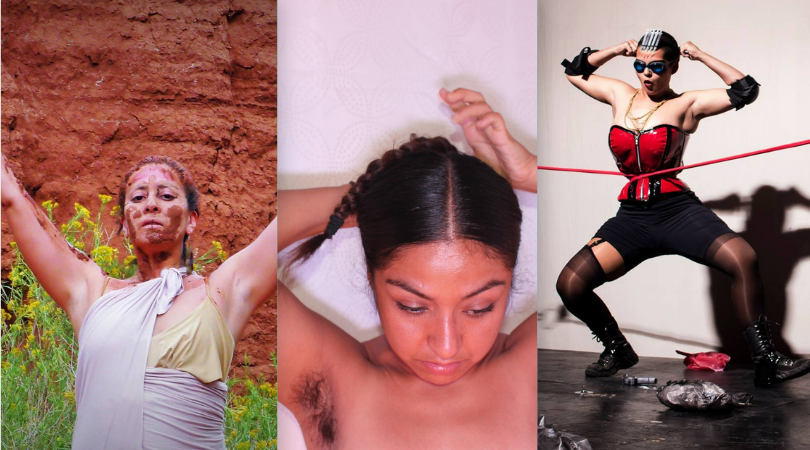Ursula Carrascal
Dance connects me to the earth — La danza me conecta con la tierra
Fabiola Torralba
The impact of colonialism in the body — El impacto del colonialismo en el cuerpo
Jenny Granado a.k.a. Maldita Geni Thalia
Post-pornography as emancipatory — La post-pornografía como actividad emancipadora
Para más informaciónUrsula Carrascal:
http://eastsideinstitute.org/ursula-carrascal/ http://www.globalissues.org/news/2018/06/03/24240 http://geogeller.com/ursula/ https://www.dancingearth.org/2018-summer-cultural-artist-ambassadors/ Fabiola Torralba: https://fabiolatorralba.wordpress.com http://www.zingmagazine.com/drupal/node/36017 http://stanceondance.com/2016/02/11/fabiola-torralba-dance-keeps-us-whole/ Jenny Granado: https://www.instagram.com/desculonizacion/ https://www.instagram.com/re_kebra/ https://vimeo.com/maldita https://rachachando.bandcamp.com/releases Jessica Carmona: www.jessicacarmona.com www.millieandthelords.net www.elviratheimmigrationplay.com Mariamalia Delgado Cob: https://www.facebook.com/PayasosBurumbun/ Suzy McCalley: http://www.suzymccalley.com/artist/ Suzy Mac - Into the Flame - Spotify link Natalie Romero Marx: https://www.natytechnicolor.com
Lopez Martinez Gustavo
11/30/2018 11:37:38 am
Interesante leer y escuchar las vivencias de mujeres tan disímiles procedencias y tan diferentes historias. Cada una es un mundo desconocido para mi pero coinsiden en mostrar su rebeldía y activismo con el arte. Me hicieron refleccionar en temas nunca abordados por mí. Espero en nuestro próximo encuentro compartir mis pensamientos.
Sandra Paola
12/2/2018 08:02:16 am
Me alegra mucho que te hayan hecho reflexionar esos temas. Espero nos compartas más la próxima semana.
Silvia Ramírez
12/4/2018 03:02:58 pm
Me encantaron estas tres perspectivas que amplían la forma como se perciben las relaciones entre mi cuerpo, lo que soy y lo que me rodea. Comments are closed.
|

 RSS Feed
RSS Feed